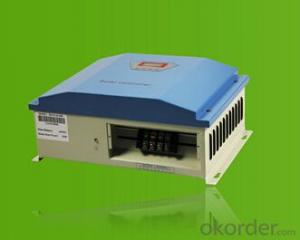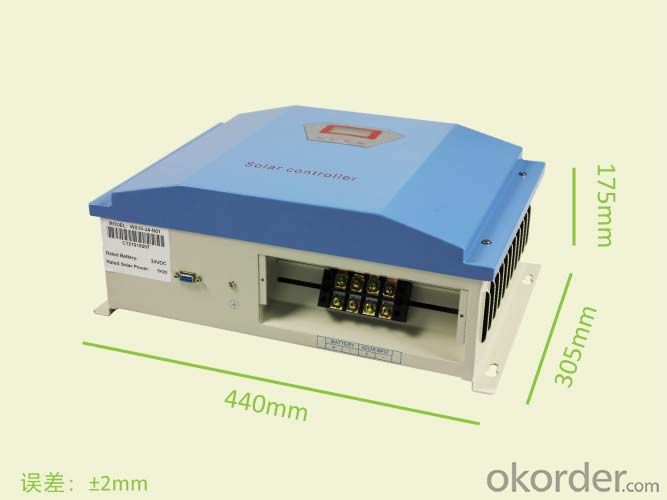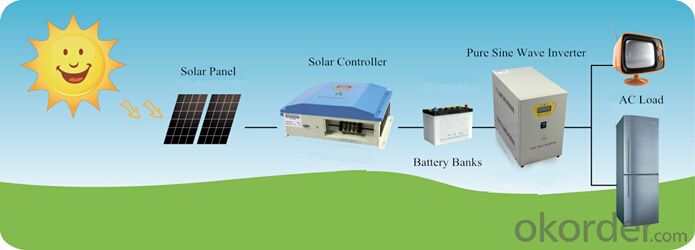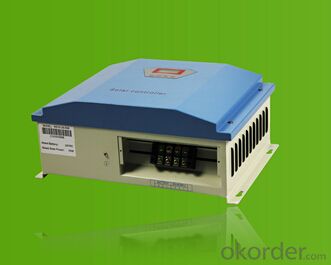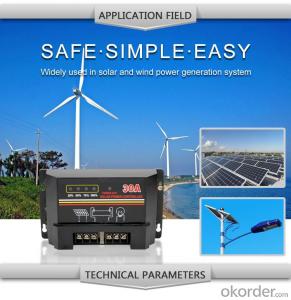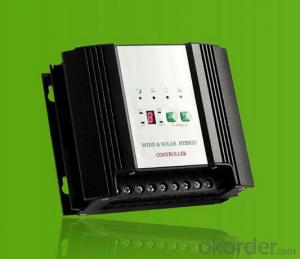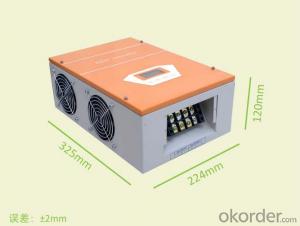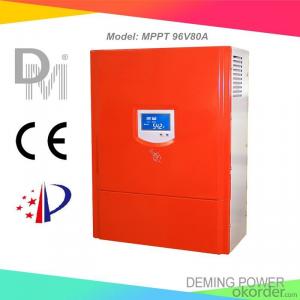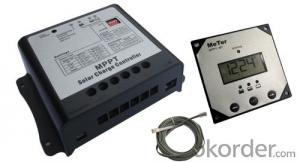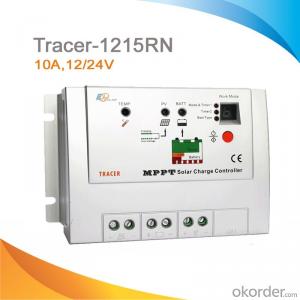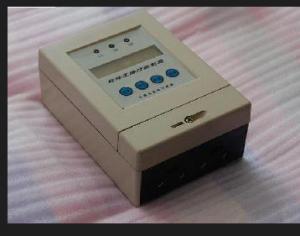Solar Power Controllers - 10kW MPPT Solar Charge Controller with Charging Function
- Loading Port:
- Shanghai
- Payment Terms:
- TT or LC
- Min Order Qty:
- 1 unit
- Supply Capability:
- 10000 unit/month
OKorder Service Pledge
OKorder Financial Service
You Might Also Like
I. PRODUCT INTRODUCTION
Solar controller is control device which can control solar panel and transform solar energy into electricity then store to the battery bank. Solar controller is the most important part in off-grid system, whose performance has much effect on life expectancy and operation of the whole system, especially the battery expectancy. Or battery service life will be shortened by over charge or over discharge.
II. PERFORMANCE FEATURES
Superior military-grade components to ensure the product stability.
Perfect protection function, thus the system has higher reliability.
Check and set all operation parameters as requirement from LCD display.
III. APPLICATION AREAS
Standalone Domestic household photovoltaic power system
Mobil communication base stations, expressway and other non-residential regions.
Coastal islands, remote mountainous, border posts for regions shortage of or without electricity.
Government demonstration projects, landscape lighting project etc.
IV. 10KW TECHNICAL PARAMETERS
Product Model | WS100-120-N00 | WS100-220-N00 | WS100-240-N00 |
Rated battery power | 120V | 220V | 240V |
Rated solar input power | 10kW | 10kW | 10kW |
Floating charge voltage | 145V | 266V | 290V |
Max Open Circuit Voltage | 250V | 458V | 500V |
Dimensions (L x W x H) | 442×307×172 mm | ||
Net Weight | 8kg | ||
Display mode | LCD | ||
Cooling | Fan | ||
Protection Level | IP20(Indoor) | ||
Quiescent current | ≤20 mA | ||
Protection functions | Battery over charge; battery anti-reverse-connection; solar reverse charge protection; solar anti-reverse-connection; lightning protection. | ||
Ambient temperature | -20~+55℃ | ||
Ambient humidity | 0~93%,without condensing | ||
Working altitude | ≤4000m | ||
In order to serve our customers better, our company can adjust parameter configuration according to customer’s requirement. | |||
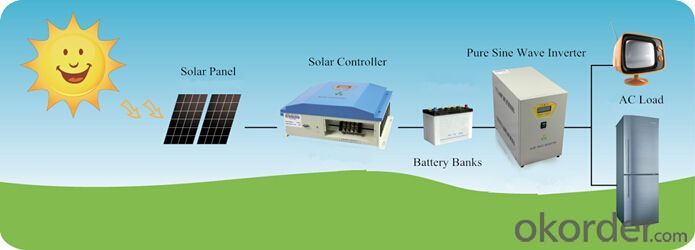
- Q: What is the purpose of the battery voltage regulation feature on a solar controller?
- The purpose of the battery voltage regulation feature on a solar controller is to guarantee that the batteries linked to the solar system are charged and kept at an ideal voltage level. Electricity is generated by solar panels from the sun, usually transformed into DC (direct current) electricity. This DC electricity is then stored in batteries for future use, particularly during periods of low sunlight or at night when the solar panels are not producing power. Nevertheless, it is crucial to control the voltage of the batteries to avoid overcharging and undercharging, which can significantly decrease their lifespan and decrease their overall efficiency. The battery voltage regulation feature oversees the voltage level of the batteries and adjusts the charging process accordingly. When the batteries reach their maximum charge level, the solar controller will either halt or lessen the charging current to prevent overcharging. Similarly, if the battery voltage falls below a specific threshold, the solar controller will amplify the charging current to recharge the batteries and prevent undercharging. By preserving the batteries at an optimal voltage level, the battery voltage regulation feature aids in extending their lifespan, enhancing their performance, and ensuring a dependable power supply from the solar system. It also aids in safeguarding the overall integrity of the solar system by preventing potential damage to the batteries or other connected components caused by improper charging.
- Q: Can a solar controller prevent overcharging of batteries?
- Preventing overcharging of batteries is one of the key functions of a solar controller. Also referred to as a charge controller or regulator, it plays a vital role in a solar power system by regulating the voltage and current that flows from the solar panels to the batteries. Its primary purpose is to protect the batteries from overcharging, as this can result in reduced battery life and potential damage. The solar controller constantly monitors the voltage and state of charge of the batteries, making adjustments to the charging current as necessary. When the batteries reach full charge, the solar controller prevents any further charging by redirecting the excess energy generated by the solar panels. Typically, this is achieved by either reducing the charging current or disconnecting the panels from the batteries. In addition to its basic functions, some advanced solar controllers offer additional features such as temperature compensation and equalization charging. Temperature compensation ensures optimal battery performance and longevity by adjusting the charging voltage based on the battery temperature, preventing overcharging or undercharging in different environmental conditions. On the other hand, equalization charging is a controlled overcharging process that is performed periodically to balance the battery cells and eliminate sulfation, ultimately enhancing battery performance. In summary, a solar controller is an indispensable component in a solar power system that safeguards the batteries against overcharging. Its presence ensures the longevity and optimal performance of the batteries, making it an essential aspect of any solar setup.
- Q: Can a solar controller be used with lithium-ion batteries?
- Yes, a solar controller can be used with lithium-ion batteries. However, it is important to ensure that the solar controller is compatible with lithium-ion battery chemistry and has the necessary features, such as voltage and current settings, to properly charge and protect the lithium-ion batteries.
- Q: What is the equalization charging mode of a solar controller?
- The equalization charging mode of a solar controller is a function that periodically applies a higher voltage to the battery bank to balance the charge levels of individual cells or batteries. This helps to prevent stratification and sulfation, ensuring the longevity and optimal performance of the battery bank.
- Q: Can a solar controller be used with a solar-powered security gate system?
- Yes, a solar controller can be used with a solar-powered security gate system. A solar controller is designed to regulate and optimize the charging of batteries from solar panels, ensuring that the batteries receive the correct voltage and current. This is essential for a solar-powered security gate system as it relies on stored energy from batteries to operate during periods of low sunlight or at night. The solar controller helps manage the charging process efficiently, maximizing the system's performance and longevity.
- Q: Can a solar controller be used with different types of solar power systems?
- Different types of solar power systems can utilize a solar controller. A solar controller, also known as a charge controller, is responsible for regulating the power flow between the solar panels and the battery or grid. Its main function is to ensure efficient battery charging and prevent overcharging or discharging. Solar power systems can be classified into two categories: off-grid and grid-tied systems. Off-grid systems are typically employed in remote areas where there is no access to the utility grid, whereas grid-tied systems are connected to the utility grid. Solar controllers are compatible with both off-grid and grid-tied systems. In off-grid systems, the solar controller manages the battery's charging and discharging processes to ensure optimal performance and extend battery life. It also safeguards the battery from potential damage caused by overcharging or over-discharging. On the other hand, the role of a solar controller in grid-tied systems differs. It monitors the power output of the solar panels and ensures synchronization with the utility grid. Moreover, it efficiently manages any excess power generated by the solar panels, redirecting it to the grid or other loads. By doing so, it maximizes the system's efficiency and offers the potential to earn credits through net metering programs. In conclusion, a solar controller is an essential component in any solar power system, regardless of its type. It effectively regulates power flow, protects the battery, and optimizes system performance. Therefore, it can be utilized in different types of solar power systems to enhance their efficiency and reliability.
- Q: Can a solar controller be used with solar battery storage systems?
- Indeed, solar battery storage systems can be utilized in conjunction with a solar controller. Referred to as a charge controller, the solar controller's purpose is to govern the influx of charge into the batteries, thereby avoiding overcharging and prolonging their lifespan. Its primary function is to guarantee that the solar panels are effectively and efficiently charging the batteries. Consequently, when employing a solar battery storage system, the inclusion of a solar controller becomes imperative to ensure the accurate charging and upkeep of the batteries.
- Q: What is the standby power consumption of a solar controller?
- The standby power consumption of a solar controller is typically very low, often ranging from 0.5 to 2 watts.
- Q: Can a solar controller be used with solar panels of different wattages?
- Yes, a solar controller can be used with solar panels of different wattages. The solar controller's main function is to regulate the flow of electricity from the solar panels to the battery or load, ensuring efficient charging and preventing overcharging. It is designed to handle a range of wattages and can accommodate panels with different power outputs.
- Q: How does a solar controller handle battery under-temperature protection?
- The solar controller's role in protecting the battery from low temperatures involves monitoring the battery's temperature and adjusting its charging and discharging parameters accordingly. By reducing the charging current when the battery temperature falls below a certain threshold, the controller prevents overcharging and potential damage to the battery. This is crucial because cold temperatures can diminish the battery's capacity and increase its internal resistance, making it more vulnerable to harm. To ensure optimal charging performance, the controller may also modify the charging voltage in response to the temperature. In more advanced solar controllers, a heating element may be activated or temperature compensation provided to maintain the battery's temperature within a safe operating range. In summary, the under-temperature protection feature of the solar controller aims to extend the battery's lifespan and optimize its performance in varying temperature conditions.
Send your message to us
Solar Power Controllers - 10kW MPPT Solar Charge Controller with Charging Function
- Loading Port:
- Shanghai
- Payment Terms:
- TT or LC
- Min Order Qty:
- 1 unit
- Supply Capability:
- 10000 unit/month
OKorder Service Pledge
OKorder Financial Service
Similar products
Hot products
Hot Searches
Related keywords


